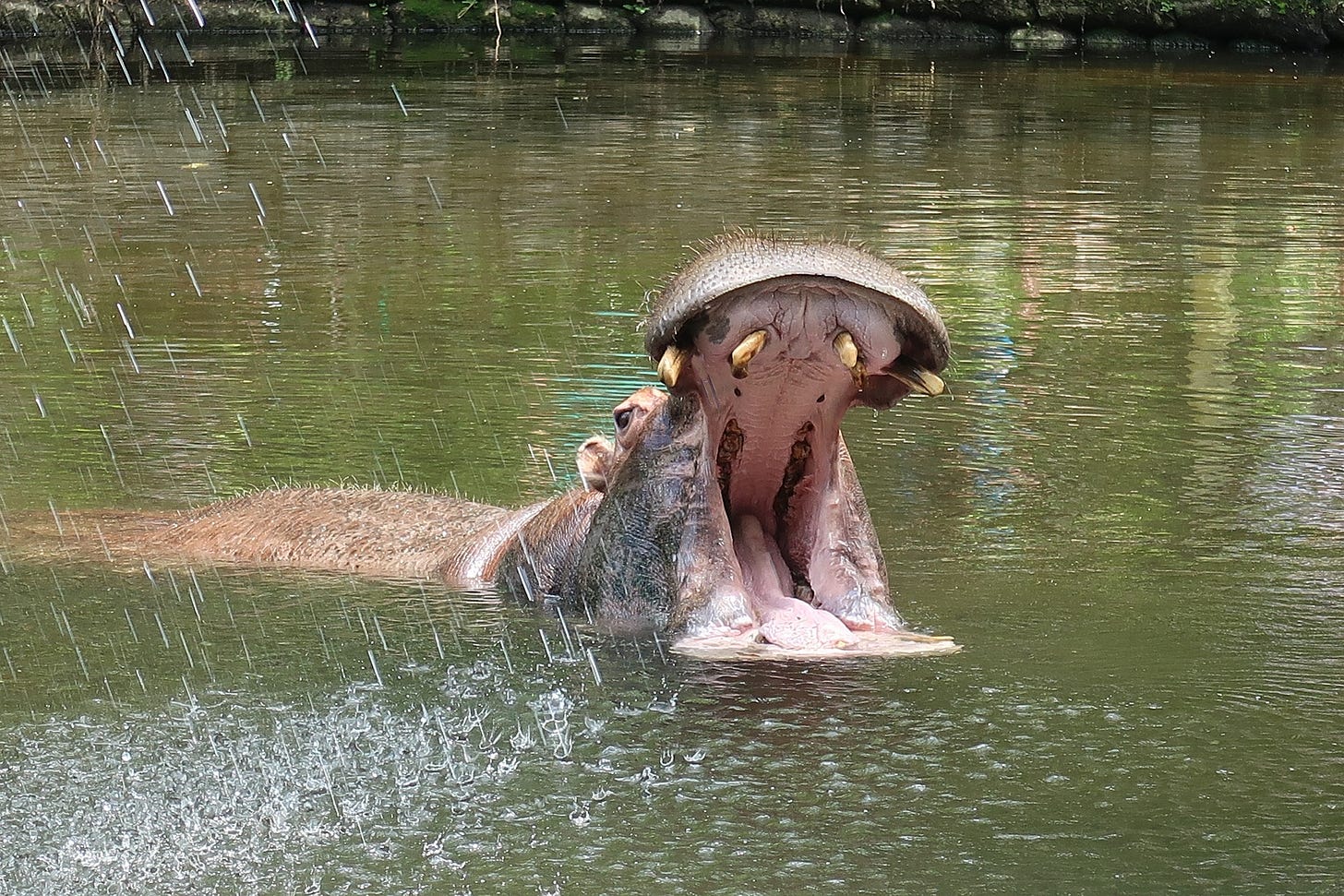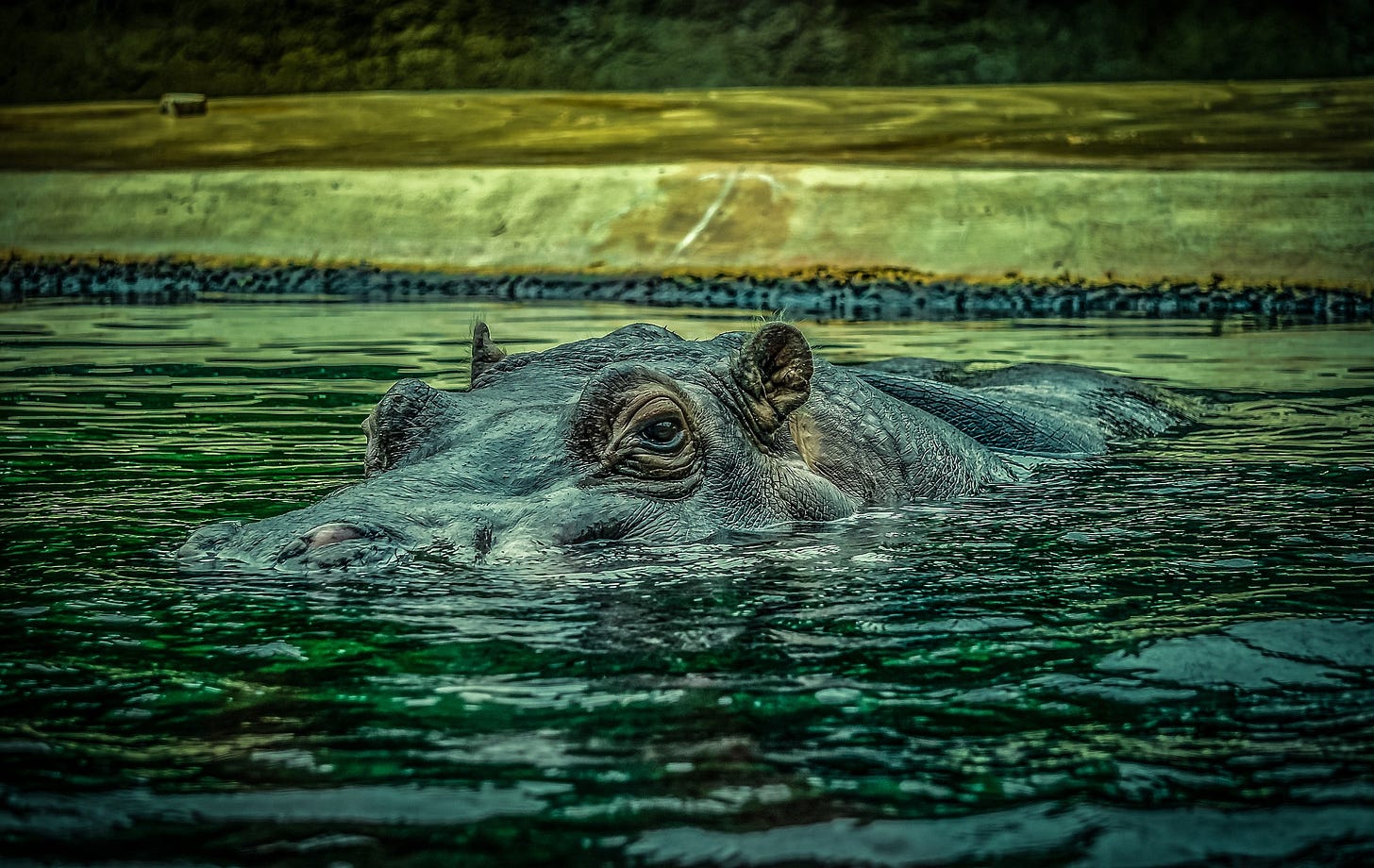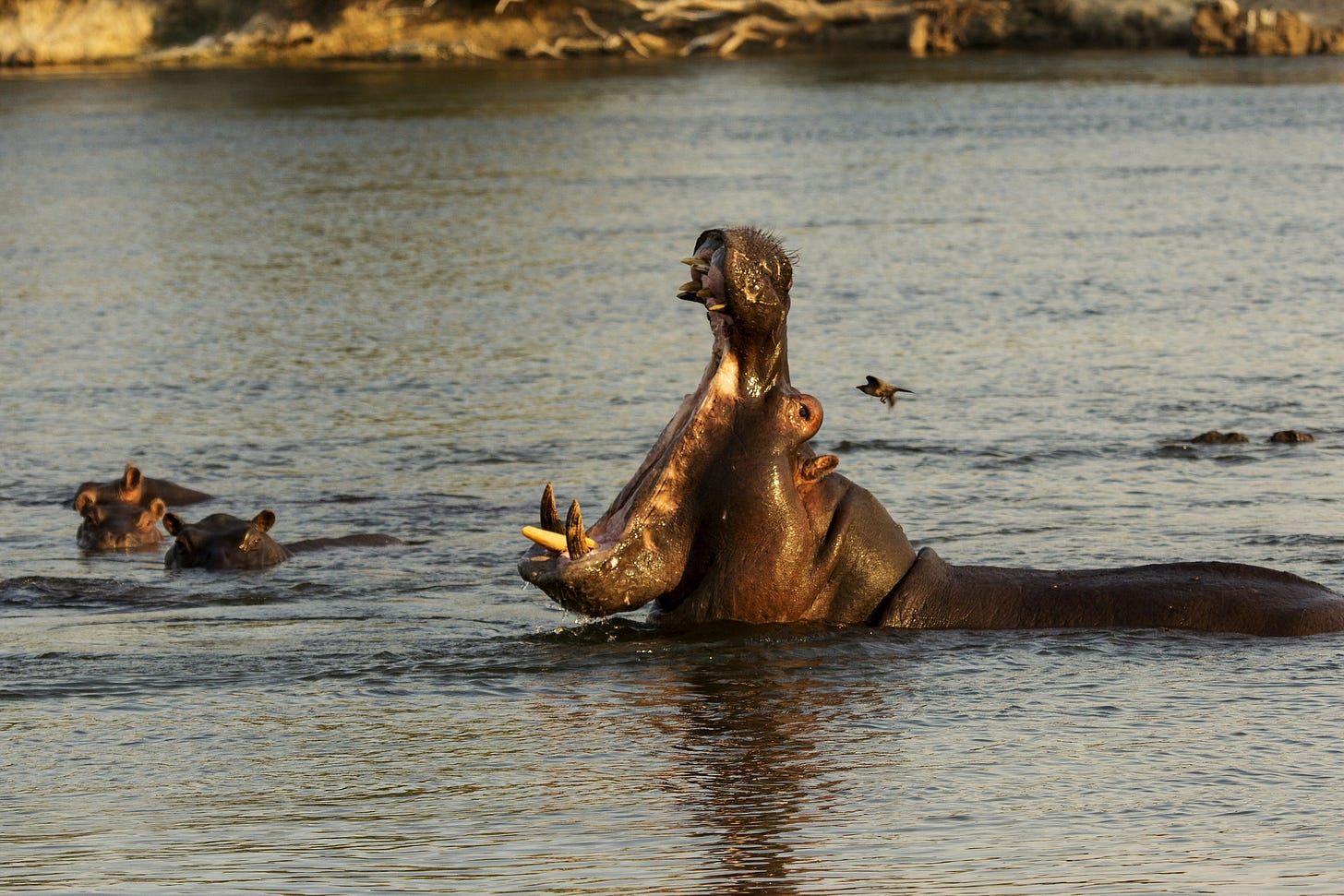#2 - Nigerian Proverb: It is Not Kindness, But the Need for a Clean Mouth That Makes The Hippopotamus Open Its Mouth for The River Bird to Peck At.
Reflections on the value of alliances for survival and growth.
Proverbs on Blast is a newsletter that publishes reflection on PROVERBS and the gems they offer for personal and professional growth. Posts are written by a learner on a quest for more wisdom (me). Keep reading. Subscribe for more. Share this post.
In this post, I dive deeper into the proverb: “It is not kindness, but the need for a clean mouth that makes the hippopotamus open its mouth for the river bird to peck at.”
This proverb comes from sub-Saharan Africa, the home of the hippopotamus. It is one of those proverbs that invoke deeper thought, elicit chuckles, and spark questions.
Four keywords jump out: kindness, clean mouth, hippopotamus, and the river bird.
There is a prominent imagery of a bird in a beast’s mouth, performing a necessary action with the latter’s consent. This incongruous imagery of a bird and a beast raises 3 questions: What is the nature of the relationship between the beast and the bird? Is the beast’s need episodic or recurring? What, if any, are the benefits for the beast and the bird within their relationship and the need?
I dig into answers to these questions under three sections:
Fun facts about the hippopotamus and the river bird this proverb references;
The nature of the relationship between the two animals and benefits; and
Key takeaways from this proverb.
Let’s begin with some key facts about the animals.
Fun Facts About Hippos
PBS helps us understand more about hippopotamuses. I collated a few highlights about them that are relevant to this post but there’s so much more there to learn from. Please visit their page and check out their collection of videos and fact sheets.
1) General Features. Hippopotamuses are humongous animals with odd-looking features. Affectionately called hippos, these animals are next only to elephants in size. A mature hippo measures about 10 – 16 ft in length, about 5.2 feet tall at the shoulder, and 2,200-9,900 pounds in weight.
Hippos have their eyes and ears on top of their heads. Their eyesight is not the sharpest but they have a keen sense of smell and hearing. With their eyes and ears being so high up on their head, they are able to see and hear even when their massive bodies are submerged under water. Also, they can hold their breath underwater for up to five minutes before they need to raise their heads above water. Even when asleep (Haddara et al., 2020).
2) Reproduction and Lifespan. A female hippo reaches sexual maturity in 6-14 years and carries one baby at a time over a gestation period of eight months. Mama hippos wean their babies at 18 months, which allows them to have several babies over the 40–50-year hippo lifespan. If anti-poaching efforts continue to be successful, hippo numbers are bound to increase from the alarming rate of near-extinction.
3) Lifestyle. Hippos are semi-aquatic nocturnal animals. They play and sleep in the daytime then eat all night, chomping approximately 80 pounds of vegetation before sunrise. Once back in the slow waters of their home, they repeat the daytime cycle of relative inactivity, alternating under and above water.
4) Mouth and Teeth. The hippo’s mouth is 50 cm wide and can open to 150 – 180 degrees. Unlike the dental structure of their fellow herbivores, hippos have a different size and shape of teeth. They have 36 teeth, which keep growing all through the hippo’s life. The top incisor can grow to be 40 cm long while the lower canine can grow up to 20 inches.
No messing around with a hippo. Their strong jaw supports long and sharp teeth, with which they can transform from vegetarians to flesh-tearing, flesh-devouring carnivores. Their bite is almost three times as ferocious as a lion’s and they can easily sever a human body in two with just one bite. It’s why they are considered one of the deadliest animals that humans and other animals must approach with caution.
Why then would such a ferocious animal permit a bird to poke around in its odd-looking and massive mouth? Though next-door neighbors in their aquatic neighborhood, the imagery of a hefty hippo opening its mouth for any bird to forage in makes one fearful for the bird. However welcoming suggests some sort of an arrangement. But, why?
Fun Facts About Oxpeckers
There is a type of river bird called the oxpecker. Oxpeckers are small parasite-eating birds, also from Africa, the home of the hippo. There are two species, named after the distinct colors of their beaks—the red-billed and yellow-billed oxpecker. Each grows to around 7-9 inches tall and 54 grams in weight. They feed on flies, ticks, and all kinds of grubs that lodge in the skin of large animals. The bigger the host animal, the better for the bird. Their large appetite needs hundreds of bugs or thousands of grubs a day to thrive.
Oxpeckers can live up to 15 years. They love open habitations but can’t thrive in deserts. The birds are a constant in sightings of large mammals that they have become the subject of scrutiny. Questions linger about the nature of the relationship between them and their large, tolerant hosts. Especially the hippo.
Hippos and Oxpeckers
Given the length, height, and weight of their bodies, hippos must find ways around their inability to perform routine functions such as scratching or ejecting parasites from their backs. Yet, they can’t do that with any of the four short legs that support their massive bodies.
Also, given the uneven shapes and sizes of their teeth, each night’s feast leaves residues in their mouths. After all, they don’t bother to wash the veggies they feast on every night so it’s inevitable that leafy bugs and grubs end up swapping addresses from Leafy Lane to Hippo Hole Boulevard.
For skin care, hippos get free service from the little fish called barbells who happily swarm around them all day. They give them top-notch exfoliation and spa treatment, probably better than what you pay good money for. They also help with some mouth cleaning. However, how much flossing and deep cleaning can they do? Not much with their soft and flat tongues. Which is where the oxpeckers come into the picture.
Mutual Benefits from The Hippo-Oxpecker Alliance
There is no way a river bird can force open the mouth of a hippo so it can get a ledge to rest on or a banquet table to pick delicacies from. It’s got to be for a reason that the hippo agrees with. Not only that, the reason must be one that yields benefits for the hippo, as well as the oxpecker. Otherwise, what animal will risk perching in a dangerous space where it can easily be buried alive?
The unusual relationship between the hippo and the oxpecker is not as unusual as it may initially appear. Both have different needs that the other helps to meet. Both derive benefits from each other. Here are the top three:
1) Early Warning System. Oxpeckers have better eyesight than their hosts and screech loudly when they spot predators. For hippos, the screech gives them sufficient time to go underwater if they don’t want to be bothered, or need to protect their young, or prepare to fight any nuisance with the audacity to approach them.
2) Dental Hygiene. The uneven teeth structure and a raw vegetarian diet makes it inevitable for hippos to get creepy crawlies in their teeth. However, the hippo’s pest is the Oxpecker’s delicacy. So, by a careful arrangement, the hippo opens its mouth wide and gives the little bird a VIP pass to peck away and clean out the bugs and grubs that think they’ve found a permanent address.
3) Skincare. In lieu of rent for occupancy on the hippo’s body, oxpeckers do deep exfoliation of the hippo’s skin. Anything that attaches itself to a hippo’s back, especially the ones that feast on the host’s blood will end up in the oxpecker’s mouth. Sometimes, they can’t distinguish between what’s on their host’s body and they worsen sores with their beaks. It’s easy for the hippo to shake off the oxpecker though, when they overstep their boundaries. Peck too hard and the source of food disappears underwater where they can’t follow.
So, there are mutual benefits from the alliance between these two unlikelies. It’s a form of beauty and the beast relationship. An aquatic version of a David and Goliath pair that are not at each other’s throat but co-exist for mutual gains.
Nature Ensures More Strange Bedfellows—Like You and ???
Each of us is either a hippo or an oxpecker in different relationships and at different times.
Each of us has a need that our physiology or something else about us means that we are not able to meet on our own. However we spin it, we won’t get that part of us under control except by forming alliances with those who can help us.
Are you at the stage where you’ve gotten real about your need and owned up to what it is? Especially when that need is due to your size and power?
Everyone’s need can be met by another. Who can meet yours? Who’s the strange bedfellow that you need?
If you’re a hippo, your need can translate to someone else’s sustenance. Chances are that person is already where you are or willing to relocate to you, because you both need each other. Who comes to mind for the need you identified? Don’t dwell on physical disparities. Figuratively, it could be a 54-gram person compared to your 9k+ pound weight. That person may have wings and fly as birds ought to while you are a walking paradox who lives in water but can’t swim and have carnivorous features though a vegetarian. The person who can meet your need may be dainty, relative to your size, power, and capabilities, but the nimbleness their size and features offer can be the antidote to the helplessness your massive strength power predisposes you to. Accept your oxpecker.
The kind of unlikely alliance between the hippo and the oxpecker is not the result of networking but of positioning.
If you’re an oxpecker, flock to the hippos. They’re large enough to feed you. They’re big enough to need you. They do not have to change their nature and be nice to you but it is inevitable that they must tolerate you.
Their tolerance of you is all you need for your steady sustenance. Their size and features are your guarantees that, for as long as they live, you will never go hungry. They must leave their habitation every night to eat all night while you can have your beauty sleep. Arise in the morning and go to their habitation for your daily sustenance. They live in herds so you can flit from one hippo to the other and feast to your heart’s content.
On a final note, however you see yourself within a particular relationship - as the hippo or the oxpecker, don’t attempt to go through life alone. Form alliances that will ensure your sustenance, protection, and wellbeing. It is the wise thing to do.
Remember, “it is not kindness, but the need for a clean mouth that makes the hippo open its mouth wide for the river bird to peck at.”
Please leave your comments below. Let’s get wiser together!







Congrats for the big start ❤
That is clear and detailed explaination for the proverb 😅 which i did not get at the begining 😁
Sometimes we have this kind of relations ib our lifes, we do not like it but we must deal with it unfortunatly.
thank you for this article.
Great idea for a newsletter! Congrats on just launching :-) I look forward to reading more.